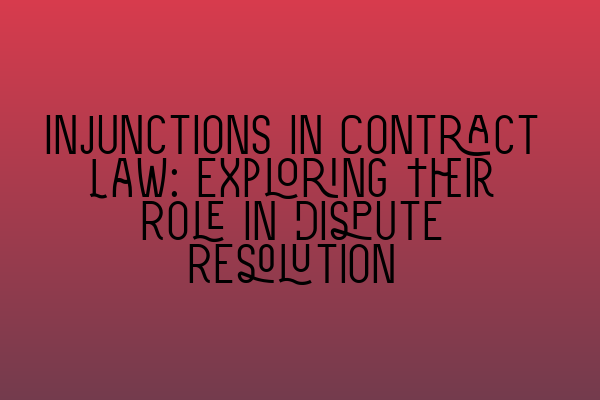Injunctions in Contract Law: Exploring Their Role in Dispute Resolution
Introduction
In the world of contract law, disputes are inevitable. When disagreements arise between parties involved in a contractual agreement, it’s crucial to have effective mechanisms in place to resolve these disputes in a fair and timely manner. One such mechanism is the use of injunctions. In this blog post, we will delve into the role of injunctions in contract law and how they contribute to the overall dispute resolution process.
What is an Injunction?
Before we proceed, let us first define what an injunction is. An injunction is a legal remedy sought by a party to prevent another party from taking certain actions or to compel them to perform specific actions. In the realm of contract law, an injunction can be an incredibly powerful tool to secure compliance and protect the rights of the aggrieved party.
Types of Injunctions in Contract Law
There are three primary types of injunctions commonly employed in contract law: prohibitory injunctions, mandatory injunctions, and freezing injunctions.
1. Prohibitory Injunctions: A prohibitory injunction aims to prevent a party from engaging in certain actions that would be in breach of the contract. It restrains the defaulting party from committing further harm and preserves the status quo until the dispute can be resolved.
2. Mandatory Injunctions: On the other hand, a mandatory injunction compels a party to perform specific actions as required by the contract. This type of injunction is sought when monetary compensation is deemed insufficient or when the breach would result in irreparable harm if not rectified promptly.
3. Freezing Injunctions: Lastly, freezing injunctions are utilized to prevent a party from dissipating their assets during the course of a contract dispute. This type of injunction is particularly useful when there is concern that the defaulting party may attempt to evade their financial obligations by moving or concealing their assets.
The Role of Injunctions in Dispute Resolution
Now that we understand the different types of injunctions, let’s explore their role in the overall dispute resolution process. Injunctions serve several important functions:
1. Protecting Party’s Interests: Injunctions act as a safeguard by protecting the interests of the aggrieved party. They provide immediate relief, ensuring that the party’s rights are respected and that further harm is prevented.
2. Preserving Evidence: In some cases, injunctions can be sought to preserve evidence that may be crucial to the eventual outcome of the dispute. By preventing the opposing party from destroying or altering relevant evidence, injunctions play a vital role in maintaining the integrity of the legal process.
3. Encouraging Negotiations: The presence of an injunction can often motivate the parties involved to engage in meaningful negotiations. The potential consequences of a breach can prompt both parties to seek a resolution, thereby reducing the need for lengthy and costly litigation.
Real-Life Case Studies
To gain a deeper understanding of the practical application of injunctions in contract law, take a look at some real-life case studies. These case studies provide valuable insights into how injunctions have been utilized in specific scenarios and the overall impact they had on the resolution of the disputes. Read more about real-life case studies in this article.
Conclusion: A Powerful Tool in Dispute Resolution
Injunctions play a crucial role in contract law by providing a powerful tool for dispute resolution. Whether through prohibitory injunctions, mandatory injunctions, or freezing injunctions, they serve to protect the interests of the aggrieved party, preserve evidence, and encourage negotiation.
If you’re interested in learning more about pursuing a career in law or the various aspects of legal practice, explore the articles below:
– Exploring Solicitor Salaries in the UK: Average Earnings and Factors Affecting Income
– Mastering Client Relationship Management: Skills for Solicitors to Enhance Trust and Loyalty
– Pursuing a Law School Education in the UK: Choosing the Right Path for Your Future
– Securing Training Contracts: A Roadmap to Becoming a Solicitor
We hope this blog post has shed some light on the importance and role of injunctions in contract law. Should you require legal advice or assistance with contract disputes, it is always best to consult with a qualified solicitor who can provide personalized guidance based on your specific circumstances.
